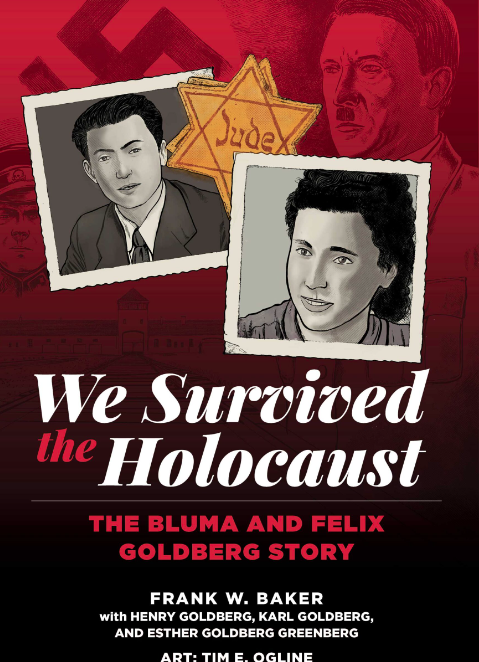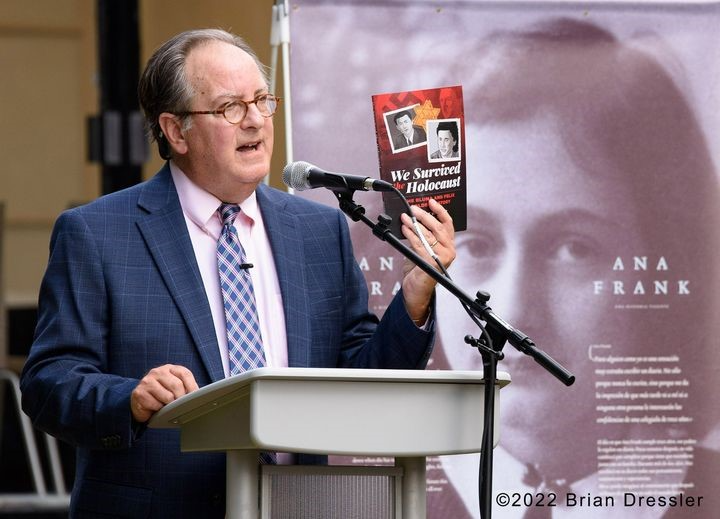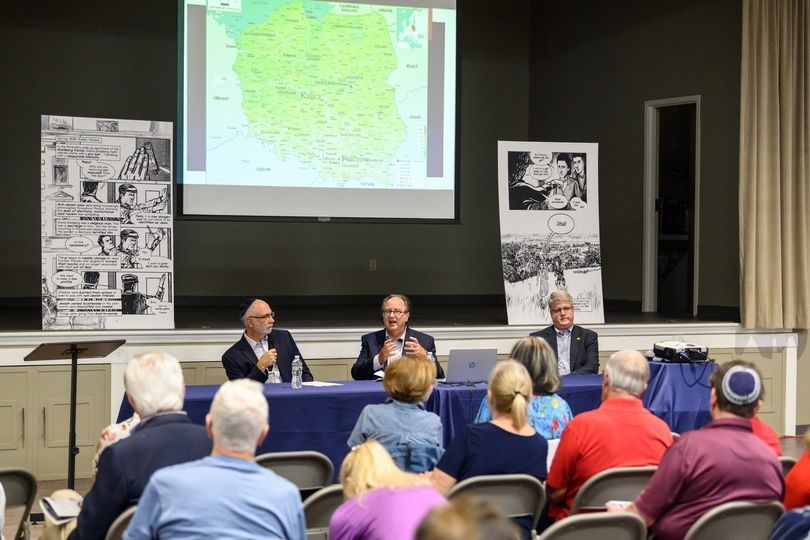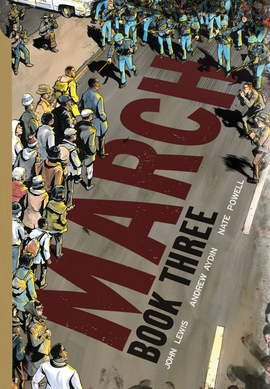 October 20, 2022 In an era that’s ushered in multitudes of media misinformation with societal outcomes ranging from extremist denialism and revisionist history to banned books and autocratic usurping of human rights, it’s readily apparent the “why you, why now” line of inquiry that I often ask authors can pretty much hit the fast forward button.
October 20, 2022 In an era that’s ushered in multitudes of media misinformation with societal outcomes ranging from extremist denialism and revisionist history to banned books and autocratic usurping of human rights, it’s readily apparent the “why you, why now” line of inquiry that I often ask authors can pretty much hit the fast forward button.
Given that author Frank Baker knows the Goldberg family featured in “We Survived the Holocaust” personally, draws from a lifelong career in media making as both an educator and an analyst of the influence of messaging in its many forms, and is Jewish himself, it’s easy to see why his purposeful prose channels all the enthusiasm of a passion project into a conduit for next generation consumption.
The timeliness (okay, urgency) of a graphic novel that blends rigorous facts and Holocaust documentation into an art form with teen touch points in its narrative is a welcome new tool, placing historic events into a context of palatable, relatable storytelling. It’s readable, appealing, and in a media culture burgeoning with hot takes on TikTok and memes aplenty, it’s academically necessary to get this right.
Author Frank Baker also runs an award-winning website of media literacy resources detailing key concepts and countless examples and prompts for critical thinking with lateral reading, citations, lesson plans and springboards into deeper, nuanced thought about global current events and media’s coverage of same…but this creative choice of using a graphic novel to tackle the gravity of the Holocaust’s heinous past bumping up against fascist political patterns in the present is alarmingly timely. Like the “Don’t Know Much About…” explainer books, it gives both an overview and detailed backstory of precursors and warning signs that make for relevant ‘aha’ moments for adults to revisit as well as youth to devour, far beyond the education realm.
Honestly, the squirm-worthy parallels of then/now rabid rhetoric prompt further exploration of whether media coverage contributes to the problem or is part of the solution given what Data & Society’s treatise the “Oxygen of Amplification” … reveals…and I have questions. Lots of them. The propensity for extremist groups to use agitation tactics to provoke a response so that social media fodder escalates into mainstream press coverage is noteworthy too, as disinformation experts grapple with best practices and journalism policies…So who better to ask about this and to douse anti-semitic flames than the author and media literacy consultant himself? Here are a handful of my top of mind concerns:
Media Literacy Expert & Author Frank W. Baker
Shaping Youth: With all the media programming recently focusing on the Holocaust (Ken Burn’s doc, CNN’s Rising Hate special projects, Rachel Maddow’s new Ultra podcast, connecting the dots on fascism then/now) it seems it’s imperative now more than ever to get your book into the mix for next generation consumption…Are you finding this task easier given ‘fascism’ is top of mind? Why/why not?
Frank Baker: I think it’s imperative that we (educators) help students see the connections between the past and the present. For example: months ago, our brilliant illustrator Tim Ogline sent me the page from our book that showed the Tishgarten family running from their home set afire by the Nazis. I immediately said “This is Ukraine, today.” This is happening right now—another dictator is forcing people from their homes. These people have nothing but what is on their backs; they don’t know where they are going and where and when they’ll get their next meals. It really is up to parents and educators to help young people recognize that the rhetoric we’re hearing today is similar if not the same as that which originated in the 30s and 40s.
Shaping Youth: How are you promoting the book to educators and school librarians and how would you describe your graphic novel to a parent or someone unfamiliar with the genre?
 Frank Baker: Thanks for asking. My first promotion was an invitation from the University of South Carolina’s School of Information Science, where a colleague invited me to introduce our book (months before its publication) to a conference of the International Association of School Librarianship, being held at the new Anne Frank Center on the university campus. My publisher agreed to “go to press” early in order to provide conference participants with a copy of the book.
Frank Baker: Thanks for asking. My first promotion was an invitation from the University of South Carolina’s School of Information Science, where a colleague invited me to introduce our book (months before its publication) to a conference of the International Association of School Librarianship, being held at the new Anne Frank Center on the university campus. My publisher agreed to “go to press” early in order to provide conference participants with a copy of the book.
Another fortunate timing was the September issue of the Columbia (SC) Metropolitan Magazine, which published a feature on the Goldbergs and referenced our book in their piece.
I decided early on that I would use every tool in my marketing and promotion toolbox to try to reach our intended audiences. So initially we created a companion webpage—and that’s where we are posting testimonials, videos, sample pages from the book and more. The book has its own Facebook page and I have been creating promotional “slides” which list my upcoming appearances. In addition, I posted two snippets from previous video testimonials of both Felix and Bluma Goldberg and edited in images from the book.
We recently were invited to participate in the School Library Journal’s Day of Dialog, where librarians joined the day long Zoom to hear authors on panels discuss and answer questions about the book. I have arranged several book signings and a panel discussion at our local synagogue.
 For that one, I enlarged two pages from the book so that audiences walking into our social hall would see immediately what a graphic novel is—since it was clear that this particular audience had no idea what a graphic novel is. Participating in that event was Karl Goldberg and Professor Jeff Eargle, a university professor who provided the audience context on how the Holocaust was represented in comic books (of the 1940s) all the way to today’s graphic novels.
For that one, I enlarged two pages from the book so that audiences walking into our social hall would see immediately what a graphic novel is—since it was clear that this particular audience had no idea what a graphic novel is. Participating in that event was Karl Goldberg and Professor Jeff Eargle, a university professor who provided the audience context on how the Holocaust was represented in comic books (of the 1940s) all the way to today’s graphic novels.
We presented a copy of the book to each of the synagogues in our community by meeting with the Rabbi’s and discussing how it could be used in education. One synagogue has already engaged me in Kristallnacht 2022—which marks the anniversary of the “night of the broken glass.”
Word of mouth has been incredibly important and Goldberg family members (collaborators on the book) have been photographed holding the book and sharing it with their families.
The family members also agreed to purchase a copy of the book for every middle and high school in the state, and we will distribute those in March 2023 at the annual meeting of the South Carolina Association of School Librarians conference in Columbia SC
We’ve just this month (October) published a companion teacher guide which we are providing to educators FREE. I thought it was necessary to have such a guide to help educators with the themes as well as the images and more.
Shaping Youth: How has the ‘banned books’ rhetoric from extremist groups trying to quell the realities of history impacted your lens? Have you had any pushback given the gravity of the Holocaust horrors or conversely, partnered with any historic entities or human rights orgs (ACLU etc.)?
Frank Baker: Thankfully there has been no impact– since the book was just released (September 1) But a member of the Goldberg family asked me what would happen if our book was banned like MAUS was…and my answer was—that’s the best thing that could possibly happen—because people would be curious about the content and like MAUS, would sell out.
If anything Holocaust education groups that I’ve been in contact with are anxious to have a book like this because they know it will resonate with the younger generation.
Shaping Youth: Your graphic novel blends hard facts in documentary style with a human interest/real life family of survivors weaved into the storyline…did you research the efficacy of using that approach to keep the reader’s interest or did this come to you organically as the narrative arch for the graphic novel? What’s your favorite graphic novel outside of your own to use as a teach tool?
Frank Baker: Honestly, the credit here goes to Tim Ogline, our award-winning collaborator and artist. Tim’s style was unknown to me until he was highly recommended by John Shableski, my editor at Imagine & Wonder (publisher). I had known (since the graphic novel began to invade school libraries) that it was THE most popular form of literacy read by students today. I recall a librarian telling me that frequently they get checked out and often are not returned. (What a problem!)
 I have been a fan of the non-fiction graphic novel for a while now. I recall picking up the 9-11 Commission Report at the bookstore; it was about 5 inches think. And then I learned of the “graphic adaptation” of the report which was endorsed by the 9-11 commissioners.
I have been a fan of the non-fiction graphic novel for a while now. I recall picking up the 9-11 Commission Report at the bookstore; it was about 5 inches think. And then I learned of the “graphic adaptation” of the report which was endorsed by the 9-11 commissioners.
The MARCH series is the one I took with me when I met separately and began doing research with the Goldberg family. When I told them I wanted to turn their parent’s story into a graphic novel, they each said to me “what’s a graphic novel?” and that’s when I pulled out one of the MARCH books and showed them. Immediately each of them got it. But I think initially there was some skepticism, but all of that dissipated when they began to see their parents’ story “come to life.”
Shaping Youth: Do you feel calling out the parallels in fascism then/now is a media literacy and critical thinking imperative? Why/why not? And how would you go about handling same?
Frank Baker: Calling out the parallels—absolutely. But my experience is since many educators may be uncomfortable criticizing a REPUBLICAN (for example) for fear of offending a student or parents; in addition many students are not “up to speed” on the Holocaust and this crucial period in world history; they simply don’t know enough. And their teachers haven’t had enough training yet to feel comfortable making those comparisons and connections. That’s where we (media educators) come in. We cannot ignore the obvious and we cannot remain silent. The phrase “silence is complicity” has been attributed to many…
Shaping Youth: Social media’s speed and scope has enabled hate speech toward targeted groups (like the ‘defcon 3’ Ye remark about Jewish people) Should instigators be ‘deplatformed’? How should media cover this type of recklessness that can incite violence and what’s your personal ‘red line’ in terms of threat vs ‘free speech?’
Frank Baker: These are difficult and challenging times for media. I worry that calling attention to much of what’s out there only adds fuel to the fire. These groups are looking for mainstream media coverage beyond social media, which has taken steps to remove their rhetoric and images.
I worry that recent remarks by Donald Trump and Ye (Kanye West) carry weight to their followers and that might lead to more hateful rhetoric, action and violence.
For example, does the reporting of anti-semitic acts in communities around the country beget more of the same?
Shaping Youth: Given the loud, reckless slurs taking place among pop culture celebrities and politicos, how would you ‘counter market’ the misinformation and messaging being amplified?
Frank Baker: Countering the misinformation? We know that these people’s attitudes and remarks come from IGNORANCE- plain and simple I think my approach must be the same as what has been recommended to those who deny the Holocaust ever happened: show them the clear and convincing evidence. It is there, it happened, and we have the words of Hitler, the actions of the Nazis and their collaborators; the inaction of the American government etc. Ken Burns’ The US & The Holocaust series on PBS).
And we must listen to and study the testimony of the survivors—those who were there. Listen to the liberators. There are so many new and untold stories just waiting to be heard. And many are being told via virtual reality and interactive video displays.
We must challenge parents and educators to bring this generation up to speed and we see our graphic novel as one way to do that.
Shaping Youth: Thanks for your time…I’m adding in a few relevant links for parents and peers to peruse given Media Literacy Week 2022 is upon us and your site is a wealth of information to uncork important conversations…
Also, I’d like to put forward an open call to interview more media literacy educators with new books, strategies, teaching tools, podcasts and hands-on activities that might help us all MARCH forward to reach and teach youth in fresh new ways that make learning stick.
Frank W. Baker’s Media & Politics Page
A wealth of pertinent links, visual insight for classroom lesson plans and activities, funding source ice breakers for conversations and analysis of stagecrafting and media constructs…Click on the main page link for a plethora of content.
DOWNLOAD: Political Ad Analysis Worksheet
DOWNLOAD: Debate Watchers Analysis Worksheet









Speak Your Mind